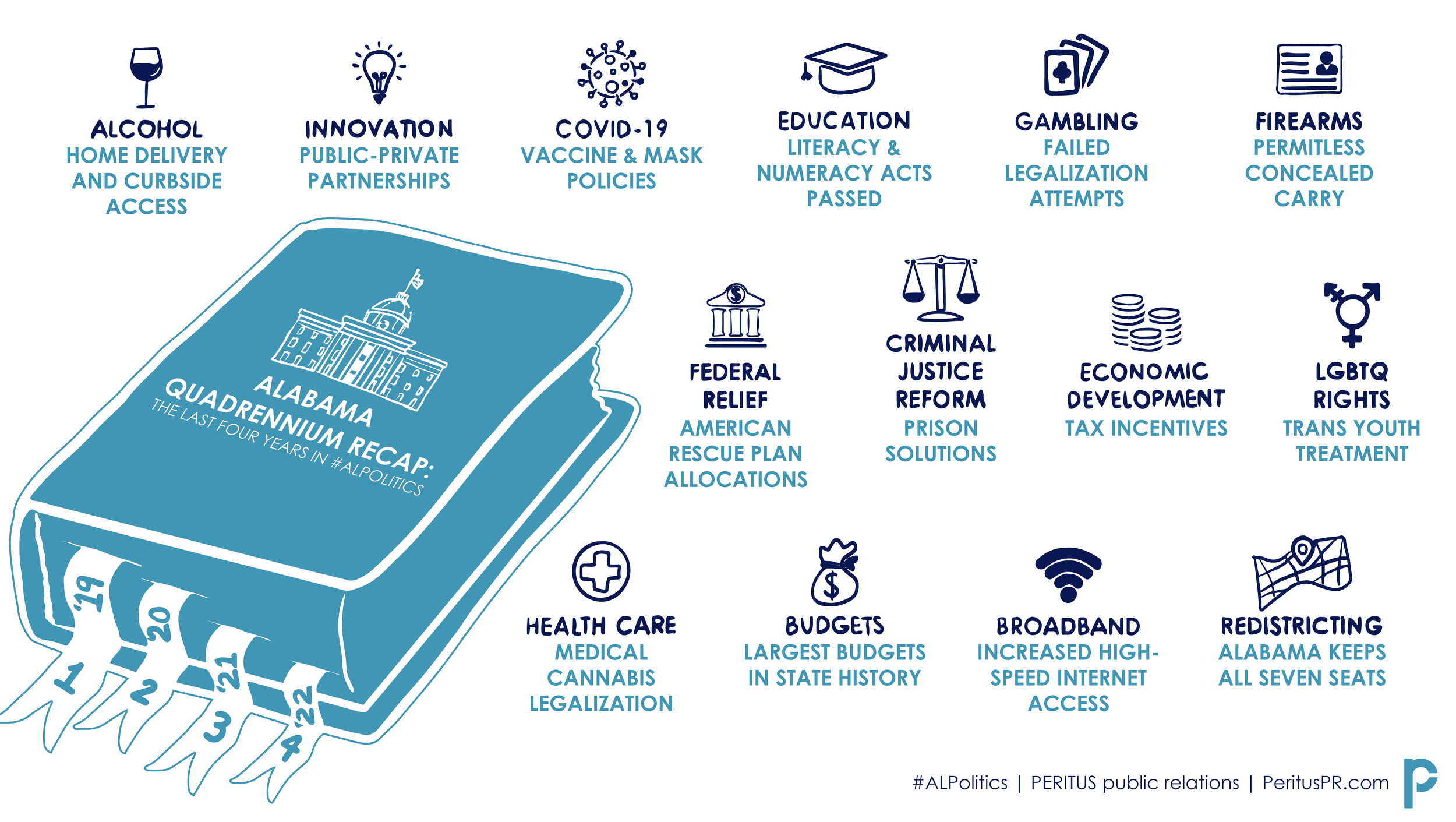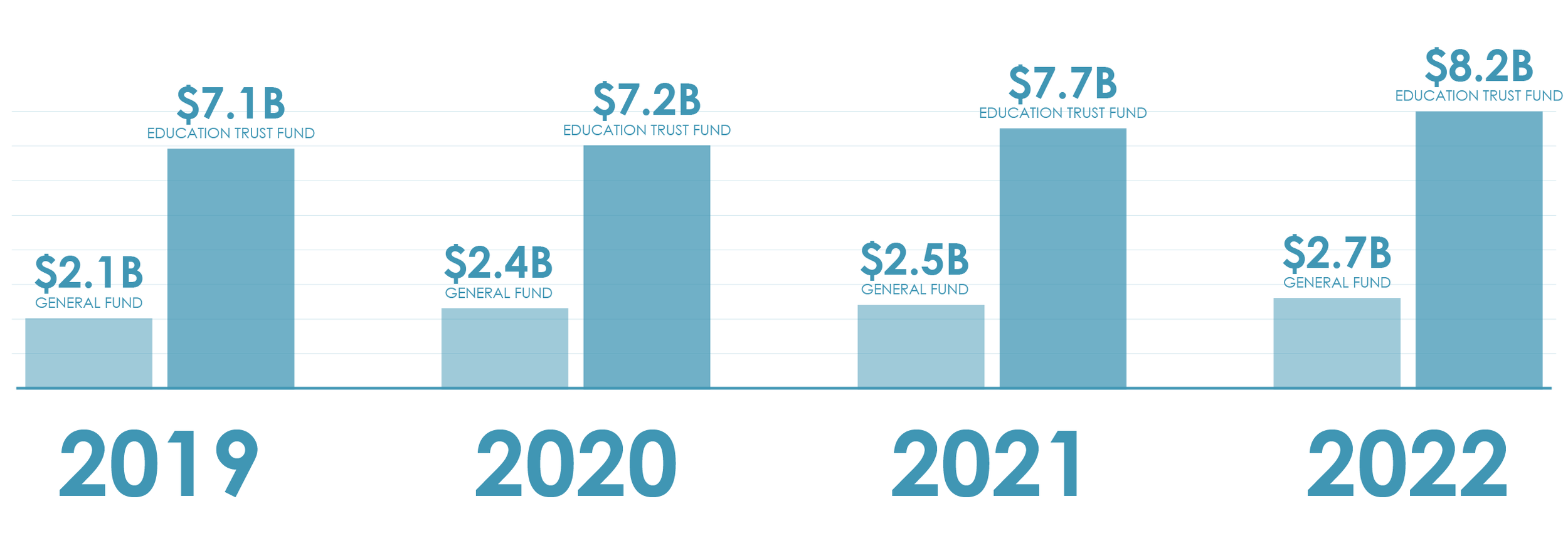Alabama Quadrennium Recap: The Last Four Years in #ALPolitics
Dear reader, by the time you’re seeing this, the 2022 Alabama Legislative Session has adjourned “sine die.”
Sine What?
Although sine die’s direct translation is “without setting a date to reconvene,” Alabama’s constitution dictates the start date of our annual legislative session. When a new quadrennium (four-year election cycle) begins, like it will in 2023, the regular session starts on the first Tuesday in March. So, go ahead and save the date for March 7, 2023.
Think of the quadrennium like your favorite political thriller. The banging of the gavel last week on Thursday, April 7 signified not only the end of this chapter (the 2022 session), but the end of the book (the quadrennium). This policy must-read series will continue when the next sequel begins with a new session.
From 2019 to 2022, we’ve seen the changing of the guard at every level of government, including a new president and a new U.S. Senator representing Alabama. We’ve seen the reelection of Gov. Kay Ivey. We’ve seen redistricting, which occurs only every 10 years after the Census. We’ve even seen a global pandemic, which only comes once in a blue moon (we hope). If we were to describe this quadrennium in a Goodreads review, we might use terms like “winding plot”, “fast-paced” and “action-packed.”
Before we pick up the next volume in this series, let’s take a walk down memory lane. Keep scrolling for the TLDR on the last four years in #ALPolitics. (Mom, if you’re reading this, TLDR is “too long, didn’t read.” It just means long story short.)
Legislative Issue Index
Budgets | Education | Economic Development | Criminal Justice | Broadband | Firearms | LGBTQ Rights | Alcohol | Covid-19 | Et Cetera
We hope you’ve come to know and love our legislative resources, but this time you’re in for an extra special edition. We’re recapping not only the 2022 legislative session, but the whole quadrennium—issues that have dominated civil discourse and the public policy that has shaped those priorities.
Curl up with a cozy blanket and a cup of tea (or something stronger)—let’s get into it.
BUDGETS
We’ve said it before, and we’ll say it again (and again). Alabama is one of only a few states that has two distinct annual budgets: one for the General Fund and one for the Education Trust Fund. It doesn’t take a glossary to interpret the difference since the names are pretty self-explanatory—the ETF is for all things education (Pre-K to post-secondary) and the GF is for, well, everything else. During the pandemic, the state benefited from federal relief boosts (shoutout to ARPA) that helped expand public services, cushion rainy day funds and pay off debts.
Despite the challenges of a global pandemic, both the GF and ETF budgets continued to grow, setting a new record each year of the quadrennium as the largest budgets in Alabama history. A payoff almost as juicy as an Agatha Christie plot twist.
EDUCATION
At the risk of aging our team…education looks different these days than it did back in our playground hay days. We didn’t have to walk to class in the snow uphill both ways, but it was the “Pre-Zoom Era.” The ways we teach and learn have been shaped by a global pandemic and evolving technology that seems to shapeshift before our eyes. Public policy has changed to keep up with the modern paradigm.
Alabama Literacy Act —Requires schools to hold back third graders who do not reach reading level standards.
Would have made the state board of education appointed instead of elected. Passed by lawmakers and signed by Gov. Ivey but rejected by voters.
Overturns ban on practice of yoga and yoga principles in public schools.
Teacher Excellence and Accountability for Mathematics and Science Act — Establishes TEAMS program to incentivize more credentialed math and science teachers.
Would have banned “divisive concepts” (read: Critical Race Theory) from being taught in K-12 schools.
Parents’ Choice Act — Would have allotted an annual stipend per student that would follow them to their parents’ educational institution of choice.
Alabama Numeracy Act — Charges the State Department of Education to set a new standard for math instruction and evaluation.
Delays the Literacy Act’s third-grade holdback requirement to the 2024-2025 school year.
Increases the income tax credit a taxpayer may claim, boosting scholarship donations.
Would have allowed county tax dollars to follow students who choose to attend public charter schools.
ECONOMIC DEVELOPMENT
The last four years posed unprecedented challenges to Alabama’s workforce, but tax incentives and other boosts along the way helped us reach new heights. With a special focus on innovation and entrepreneurship, the state is better positioned than ever before to claim our place on the global innovation stage.
Alabama Incentives Modernization Act — Expands the scope of the Alabama Jobs Act and uses tax incentives to attract tech companies into rural areas.
Renews the Alabama Jobs Act and Growing Alabama Act.
Creates the Alabama Innovation Corporation, a public-private partnership to drive innovation and entrepreneurship in the state.
Creates the Innovate Alabama Matching Grant Program, making federal SBIR/STTR funds more accessible to Alabama entrepreneurs.
Renews the Alabama Historic Rehabilitation Tax Credit.
Alabama Credential Quality and Transparency Act — Would have created a registry for all available, valuable workforce credentials such as certificates and licenses.
CRIMINAL JUSTICE AND PRISON REFORM
Alabama Department of Corrections and the U.S. Department of Justice have been in a back-and-forth for several years over the unconstitutionality of Alabama prisons. Gov. Ivey called a special session on the issue, and in October 2021 she signed a plan authorizing the construction of two new prisons (paid for with ARPA $$) to help alleviate overcrowding and poor conditions. This is really the tip of the iceberg folks.
Aniah’s Law — Gives judges discretion to deny bail for defendants of six violent offenses including murder, advanced sexual assault and human trafficking. Goes to voters in November.
Creates a statewide database to keep centralized records about law enforcement officers including disciplinary actions, excessive force complaints and reassignments.
Would have repealed the Habitual Felony Offender Act, a policy that increases penalties for repeat offenders.
Bans the use of shackles on pregnant women, women in labor and women recovering from birth during the postpartum period.
Would have ended driver license suspensions due to unpaid traffic tickets.
BROADBAND
Broadband access has been a hot topic in the state recently, especially on how best to connect rural areas. Businesses, families and even our favorite rural librarians see this as a big priority for the state to remain competitive. In every category from education to business to health care, access to high-speed internet is non-negotiable.
Broadband Using Electric Easements Accessibility Act — Allows electric utility providers to add high-speed cable lines to their existing utility networks.
Rural Broadband Access Initiative — Expands the Alabama Broadband Accessibility Fund by $20 million for broadband projects in rural areas.
Streamlines regulation of small cell wireless facilities.
Connect Alabama Act of 2021 — Creates the Alabama Digital Expansion Authority to oversee the continued rollout of broadband in the state.
Allocates ARPA funds, including 36% ($277 million) to broadband expansion.
Increases the minimum service threshold and encourages higher-speed internet.
Enables government entities to qualify for ADECA Broadband Accessibility Grants.
Proposes a constitutional amendment to allow state and local governments to channel federal grants to private companies for the purpose of broadband infrastructure. Goes to voters in November.
FIREARMS
With a president in office who has implemented firearm restrictions, Alabama lawmakers have taken measures to push back, including the passage of legislation which enables Alabamians to carry a concealed firearm without a permit.
Alabama Uniform Concealed Carry Permit Act — Extends validity of a concealed carry permit to life and standardizes background checks across Alabama’s 67 counties.
Legalizes permitless carry of a concealed firearm.
Alabama Second Amendment Preservation Act — Proposes a constitutional amendment that would ban the use of public resources to administer any presidential executive orders restricting firearm “ownership, use or possession.”
LGBTQ RIGHTS
Alabama is among many states across the U.S. that have weighed issues pertaining to transgender people, particularly minors. Most legislation has focused on student athletes and access to health care. On the last day of the 2022 session, and therefore the last day of the quadrennium, lawmakers granted passage to two controversial pieces of anti-trans legislation. If the trend continues, we can expect to see LQBTQ issues brought to the table again in the next quadrennium.
Requires student athletes to play on teams associated with their gender assigned at birth.
Mandates K-12 schools to enforce biological sex use of multiple occupancy bathrooms and changing areas. (Think: locker rooms.)
Makes it a felony for doctors to provide gender-affirming care, such as hormone therapies and surgeries, to minors.
ALCOHOL
In an era when folks were enjoying a cold beverage in the comfort of their home instead of frequenting their favorite bars, Alabama’s alcohol policies got a little laxer. Sheltering in place (whew, haven’t heard that in a minute) lit a fire under lawmakers to make alcohol more accessible to folks through home delivery and curbside pickup.
Enables out-of-state wine producers to procure a license from Alabama Beverage Control to ship directly to Alabama consumers.
Enables Alabama residents (21+ of course) to enjoy delivered brewskis from licensed in-state retailers such as grocery stores, private liquor stores and breweries.
Legalizes drive-through beer and wine sales by ABC-authorized retailers for off-premise consumption.
Allows food trucks to secure on-premise permits, qualifying them to sell alcohol in open-container entertainment districts.
COVID-19
Think back to your high school English 101 class... Do you remember the three types of conflict in literature? Man vs. man, man vs. nature and man vs. self. Over the last four years, we’ve seen it all. To help individuals and businesses alike, lawmakers implemented tax exemptions to minimize the financial impact of the pandemic on families and businesses.
Exempts federal relief funds from state income tax.
Protects businesses against Covid-19 liability.
Restricts municipalities from mandating vaccines.
Excludes select ARPA benefits from state income tax for families.
MISCELLANEOUS
Medical Cannabis - Pay Equity - Infrastructure - Family Leave - Campaign Finance - Abortion - Voting Rights - Daylight Savings Time - Taxes - Lottery -
Medical Cannabis - Pay Equity - Infrastructure - Family Leave - Campaign Finance - Abortion - Voting Rights - Daylight Savings Time - Taxes - Lottery -
We’d be remiss not to include important milestones across health care, infrastructure, gambling and other policy areas that impact how we live and work.
Rebuild Alabama Act — Increases gas tax from 18 cents to 28 cents per gallon over the next three years. This is Alabama’s first gas tax increase since 1992.
Clarke-Figures Equal Pay Act — Prohibits wage discrimination on the basis of race or sex.
Reforms campaign finance by requiring municipal electoral candidates to file campaign finance reports with the Alabama Secretary of State.
Would have required doctors to perform life-saving care on babies born alive after an abortion. Passed by lawmakers and signed by Gov. Ivey. Overturned in federal court.
Bans curbside voting.
Proposes a resolution to update the Alabama Constitution to reduce redundancy, consolidate clauses and remove racist language. Goes to voters in November.
The Compassion Act — Legalizes medical cannabis and creates the Alabama Medical Cannabis Commission to regulate the product from seed to sale.
Makes the state of Alabama observe Daylight Savings Time year round if Congress authorizes the Sunshine Preservation Act.
Most recent of many gambling packages that had a run during this quadrennium. Would have established the Alabama Education Lottery and Gambling Commission. Proposes a constitutional amendment to legalize casino gaming, sports betting and lottery retail (scratch-offs).
Makes family leave more equitable for adoptive parents by giving them the same access to 12 weeks of unpaid leave available to biological parents.
Would have proposed a constitutional amendment to end Alabama’s grocery tax.
Would have phased out occupational taxes.
Our PUBLISHED by PERITUS takeaway is this:
From health care to education to infrastructure to job creation and more, the 2019-2022 quadrennium was transformational for the state of Alabama. Lawmakers overcame the challenges of convening during a global pandemic to make movement on issues that impact everyday Alabamians.
Thanks for joining us on this journey as we helped make sense of what passed, what didn’t and what it all means for our state. Hopefully, you learned along the way that no matter your comfort level in the political sphere, there’s a seat for you at the table.
Peritus is here to equip our fellow Alabamians with the tools needed to make your voice heard.
THE END.
Well… for now. We’ll be watching closely this November as midterm elections set the tone for the new quadrennium.
Written by Bella Tylicki, Elizabeth Paul and Louise Oliver. Creative by Sally Goodloe.
















